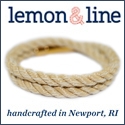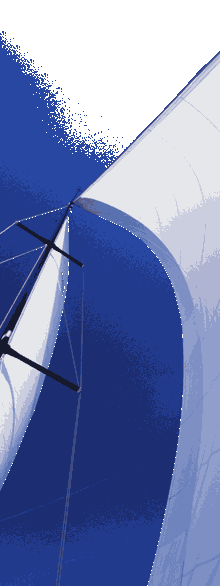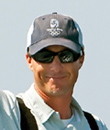
|
|
Mark Ivey: Coach of the Year (December 19, 2009) At thirty-two years old, Mark Ivey just received the US Sailing Coach of the year award. Michelle Slade talked to Mark about his career as a professional sailing coach: I grew up in Huntington Beach, CA and learned in the junior programs in Huntington Harbor and at the Alamitos Bay Yacht Club in Long Beach. We sailed in Sabots which was the first boat I learned to sail on, then I gradually starting crewing for a lot of people to learn about the racing scene a little more. My sailing developed from there. I continued to do all of the youth program regattas, I qualified for the youth championships, and started sailing more out of California and out of the country in my early and mid-high school years which made me see that there was a lot more out there. I made the decision to go to college somewhere I could continue sailing and I found a school on the east coast in Maryland, St Maryís College, a beautiful, small school on a river off the Chesapeake Bay. It had a great sailing team and I wanted that small school experience. It opened my eyes to the east coast. I had a great coach there, Adam Werblow, who helped me a ton through my college sailing and I was lucky to have a lot of success right away in college. I was a four-time All American starting my freshman year, and in my senior year I was recognized for the highest award, College Sailor of the Year, in 1999. We had an outstanding team and worked really hard at our sailing. It helped lead into coaching and helped me make sailing a huge part of my life and the decision to make a career out of it. I had grown up on the west coast and I love exploring and finding new places so being at St Maryís and on the east coast exposed me to people I wouldnít normally have met if I had stayed on the west coast. But, I have always liked Northern California and I love San Francisco Bay and I was able to navigate back out here. I worked for a couple of teams, first down in Santa Cruz with Pegasus and Phillipe Kahn full-time on his sailing team. We often sailed in the Bay so I got to know the area. I did my own Olympic campaign in Athens in 2004 and was exposed to a lot of the management side of the sport. I saw a need for high-level coaches, at least at the Olympic level. I was trying to make some money first off, and to continue the sailing dream I had. Professional sailing can be tough. Lucky Iíve succeeded but the early stages I was just a new kid trying to learn all the different routes in the industry. Coaching helped supplement that and to get my name out there. Some of the first teams that I started to coach were in the Star class. I coached quite a lot down in Miami where the Olympic trials were in 2004. I got hired by Andy Lovell and Magnus Liljedahl as their coach all the way through those trials, so that was my first professional coaching gig. The team was sailing full time and we had a daily schedule, I had my own coach boat, video cameras and digital cameras, we did a lot of meetings and debriefs and that all became a very big focus all the way through their Olympic trials. They were second at the Olympic trials so they just missed going. Magnus had already won an Olympic Gold, so right away, I was working with the best athletes out there and I really enjoyed it. Thereís definitely something about working with Olympic athletes. They are pursuing their dreams and trying to become just the best they possibly can, which is a lot different to other coaching that happens in sailing, as theyíre paying with their own money and really putting it as a main priority in their lives so their sacrifice is pretty high. Theyíre very responsive, very organized and very passionate about what theyíre doing. Itís awesome to be around people like that and I try to raise my level as a coach to match what theyíre trying to give as an athlete. I have done an Olympic campaign (in 2004, in the 470, and finished third at the Olympic trials with Howard Cromwell), so I know about the logistics involved and the challenges of fund-raising and committing to doing the Olympics. You donít have a normal life so I an understanding of what they are going through off the water to get to an event. I also think I bring people together in an open format to work together - Iím able to be social with them and provide a chance for them to open up. As I said, often these athletes are professional in their own right, all very talented so they donít need micro managing. Itís much more about helping them focus on the moment, things that are important to their performance. I try to provide a format so that they donít have to worry about all the other stuff: that there will be a meeting spot every day at the same location, where they can come and get pictures from me from the racing on the day before, they can study video if they want, thereíll be weather briefings for that day - data I collect and compile for them. So itís about consistency and providing information. Once weíve had the daily meeting, we know our dock-off time, and weíll all head out as a group at the same time. Iím working with the US Sailing Team AlphaGraphics right now so itís a team atmosphere. I normally tow my sailors out to the racecourse, and it just helps the sailors feel like theyíre part of something bigger. I think thatís the big thing, for a long time in US Sailing itís been a lot of individuals pursuing their Olympic campaign. They have hired private and individual coaches (Iíve done that myself) but my transition to the US Sailing team is where Iím trying to push, hey, weíre going to get better results if we are a team, and speed-test before the races together. If we have that meeting together and collect a lot of peopleís perspective on whatís going to happen for the day, what they learned the day before, and we can share all that, weíre suddenly expanding the collection, experiences and amount of information. The venue for that Star class championship was in Sweden. I had about a week of training before the event in which we really learned about the current - there was a lot of water moving underneath there - the wind direction changed frequently there. For the Star Worlds, collecting a lot of this pre-race information was important. Once I had dropped them off at the start, I would zoom around the course to different locations and I would measure the current, take wind readings, then I would head back to the starting line and quickly pass off in a summarized version what I thought about the characteristics of the racecourse. I didnít tell them what to do with that info as much as I would just provide it. The info helped as the Star Class has a long first windward leg so if you were going the wrong way against the current it really could hurt you. Having them all prepared for that was useful. Trying to provide a team atmosphere was important. George and Rick started off sailing their worst race of the event, which could have been discouraging. The next day after this race, Rick asked me if he should dive on the boat before heading out. I said to him, ďWell, if you had won the race yesterday, would you dive on the boat?Ē He looked at me and said, ďOf course I would.Ē So, he went down and cleaned the boat. Again, providing consistency and not letting people off the hook if they had a bad performance or good performance. Itís about the daily routine and that detail. They went out and had a great race that day. The challenge often in life is doing something youíre happy with and getting paid for it. There arenít a ton of pro sailors out there, itís not like itís a major in college, and not a lot of info out there how to have a career in sailing. After college when I decided to continue sailing I think the hardest thing was to stay to that commitment and figure out how to make money all the way through sailing and not have it be a just a weekend hobby. The other challenge is working with owners and marketing yourself, making smart decisions about who you work with and who you decide to take on coaching. Iím continually linking together my work schedule, my coaching, and my professional sailing. There are a lot of people who have helped me a long the way for sure. My parents, Kevin and Judith, first and foremost were a huge influence, their encouragement and love of the outdoors, and sailing fit right into that. And, they werenít sailors themselves growing up (they are Australians - Iím a dual citizen). My father really inspired me to keep sailing when I was young. They drove me to every summer sailing practice, and encouraged me to look for colleges on the east coast when my other siblings all stayed on the west coast. I have to imagine that was a big step for them. Iíve mentioned my college coach Adam Werblow. For the last 10 years, thereís no-one specific but I must mention Nick Skandone, the paralympic sailor who passed away recently. He was a junior sailing coach of mine in Southern California and we kept in touch all the way through. He was awesome. Itís a good question. The level of Olympic sports has been raised for sure. The technology, especially with regard to equipment, is better and people are starting earlier in their lives towards the Olympic goal and being the best at their sport in the world, so coaching has to match that goal as well. With that, everything that goes into that equation of success has improved and looked at carefully. The use of video cameras and downloading immediately after training each day is a part of coaching now - I take a printer to regattas with me and print off pictures so that people can see their sail shape. I video other people out there and our own sailors so that you can see mechanics and order of operations when you go through setting sails, rounding buoys, and starting line stuff. The collection of information and the efficiency with which we can review it has improved. Iíll continue towards coaching for the 2012 Olympics in London with the US Sailing Team AlphaGraphics for the next 2 Ĺ years, and Iím not sure what will happen after that but thatís my short-term goal. Iíll continue racing professionally as a tactician on race teams as often as I do coaching. (Mark laughs) She is my girlfriend but no, I donít. We have gone to many of the same events but I stay with the coaches because she has her own team & focus as do I. Itís only fair for the people weíre with to keep it separate and focus on what it is we are each doing. Check out Markís new website at: www.iveysailing.com back to top |







|


